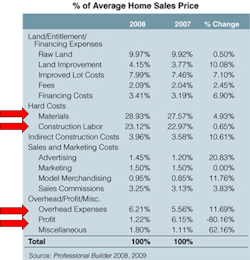THE IMPACT OF QUALITY FOR BUILDERS
What REAL bottom-line impact can Quality have on my business!
When we look at the cost of not having quality, quality quickly becomes an investment worth making. Consider the costs of poor quality that the industry suffered during the boom as described in this Business Week article.
http://www.businessweek.com/magazine/content/11_08/b4216020278215.htm
A study by Professional Builder Magazine in 2009 ranked the issues that the Magazines ‘Giants’ say as the greatest opportunities to focus on. The top opportunity was Operational Efficiencies and third ranked was better product and service. These issues reflect a need for quality tools and techniques.
If we consider the potential for such operational efficiencies based on the opportunities cited in we can see that significant impacts can be made. Let us consider small to medium sized organizations and the construction organizations. Quality costs break down into Failure (defects) Appraisal (audits and inspection) and Prevention (training etc) this represents 3-4% of revenue. Research shows that in Failure Costs represent 65-80% of an organizations quality costs. If we take these number and the profits presented in Figure 1 below from the same study published in Professional Builder Magazine in May 2009, we can propose the following example.
- Take 3.5% of revenue is cost of quality
- 75% of cost of quality is failure costs
- = 2.62 % of revenue is failure cost
- Therefore on a $150k home $3930 is failure cost
- On a $150k home the profit at 1.22% is $1830
- If 50 homes per year are built that equals $589,500 of failure cost per year, the equivalent of 4 homes per year.
Would you like to add that additional profit to your bottom-line each year!
Here is some data captured by Quality Built field inspectors on 31,995 completed homes and condominiums across 27 U.S. states for the 12-month period ending October 1, 2005 showed:
- Single-family homes averaged $5,398 in corrected defects per home.
- Multi-family homes and mixed commercial use construction averaged $4,556 in corrected defects. (Quality Built, 2006)
An example of the potential impact of driving improvement is clearly illustrated by the following calculation by JD Power. (2006) Lets consider that reducing defects and customer call outs improves customer satisfaction. For JD Powers data taking an average builder at an index score of 112 receives 3.96 positive recommendations per homebuyer. At an Index score of 122 the average builder could receive 4.62 positive recommendations per homebuyer. If a builder focused on making an improvement in their customer satisfaction index score from 3.96 to 4.62 they would gain 0.66 additional recommendations per buyer. Making assumptions based on return rates average sales price etc for JD Powers customer based, this would ultimately translate to $175,000 in profit.
Here is another example, in a modular home building company study by the Department of Energy (US DOE, 2005) the implementation of Kaizen (continuous improvement) resulted in a 59% labor productivity gain and a 22% cycle time reduction.
Survey of NHQ Certified trade contractors and builders revealed that:
- 80 % of NHQ Certified trade contractors reported a reduction in callbacks
- 88 % achieved an increase in employee accountability
- 79 % improved relationships with builders
- 65 % improved their bottom line.
- 70 % of NHQ Certified builders improved their bottom line
- 75 % reported a reduction in callbacks and improved relationships with trades.
(NAHBRC, 2007)
In 1997 a study by NAHB cited builders with an average net income before taxes of 5.1% and a gross margin of 18.5%. Whereas the NHQA builders achieved an average net income of 11.2% and gross margin of 25.5%. (NAHB, 1997)
So what are YOUR costs of quality, what are your Failure costs?
Which quality tools and techniques are you going to use to improve YOUR bottom-line!
Your best step to impact you bottomline…..apply for the NHQA
http://www.housingzone.com/pb/NHQA
This link answers the most frequently asked questions about the NHQA
http://www.housingzone.com/pb/FAQ
NEXT TIME Benchmarking

